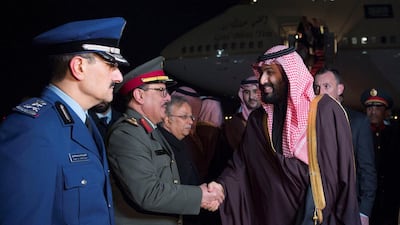Saudi Crown Prince Mohammed bin Salman's visit to the United States comes at an “important time in the history of the Middle East”, Foreign Minister Adel Al Jubeir said on Monday.
Speaking in Washington just hours before the crown prince was due to arrive, Mr Al Jubeir named Iran’s "dark vision" in the region as a major challenge, along with the Yemen conflict and countering extremism.
The visit also comes “at an exciting time in the Kingdom”, as Saudi Arabia takes strides in diversifying its economy and implementing reforms, he said.
"Relations with the US are at an all-time high," Mr Al Jubeir said, anticipating "a number of agreements to be signed on this trip" in the fields of investment, trade, technology and education.
Asked about the potential for a nuclear energy agreement that will allow Saudi Arabia to build reactors in the Kingdom, Mr Al Jubeir said Riyadh was in "discussions with the United States as well as other countries" on the issue.
He named Russia, China, France, South Korea and possibly Japan among those his government was assessing for possible co-operation. “We want the best,” he said.
Prince Mohammed's visit, which will cover seven cities in 20 days, will be his fourth official trip to Washington but the first since becoming crown prince in June 2017.
He will tour the US from coast to coast, starting in Washington this week before travelling to Boston, New York, Seattle, San Francisco, Los Angeles and Houston. He will be accompanied by a large delegation from the ministries of energy, commerce, trade and others.
In Washington he will meet President Donald Trump at midday on Tuesday, as well as Vice President Mike Pence and senior administration officials from the defence, intelligence, energy, Homeland Security, commerce and treasury departments in the coming days.
The crown prince will also meet with Congressional members of both parties.
_______________
Read more:
The aim for Saudi Arabia and the US must be to find a common game plan
Mohammed bin Salman in his own words
Saudi Crown Prince: We will expel Muslim Brotherhood elements from our schools
_______________
Mr Al Jubeir lavished praise on Mike Pompeo, Mr Trump's nominee for secretary of state in place of Rex Tillerson.
"Mike Pompeo is a distinguished person, a friend, and he will do a splendid job," he told The National.
Addressing regional issues, the Saudi foreign minister was harshly critical of Iran, saying the Iranian vision was “one of darkness” in the Middle East, “sowing sectarianism and using terrorism”.
This vision “is inevitably doomed to fail”, he said.
He described Iran's nuclear deal with world powers as “flawed” but said it was an American sovereign decision to decide whether to withdraw or fix it in May. He cited the deal's sunset clause, Iran's ballistic missile programme and its regional behaviour, as issues that Saudi Arabia would like to see addressed in any new text.
On Yemen, Mr Al Jubeir said the Houthis were on the defensive, “no longer on our borders” and held much less territory. He insisted on a political settlement as a final solution but blamed the Iran-backed rebels for impeding such an outcome and not accepting UN resolutions.
Asked about the Qatar dispute, the Saudi foreign minister called it “a small matter”.
He said Iran, Iraq, Yemen and Lebanon were all more important for Saudi Arabia at present.
“The world sees an attractive face of Qatar, a young leadership, a glamorous mother, art museums, US campuses, fancy buildings”, but “we deal with the dark side of Qatar”, he said.
He named terror financing, radicalisation, incitement and support for extremist clerics among the list of problems with Qatar, as well as Doha reneging on its commitments in 2013.
“We are not in a hurry,” Mr Al Jubeir said, lowering the chances of a Camp David summit on this issue in the near future.


